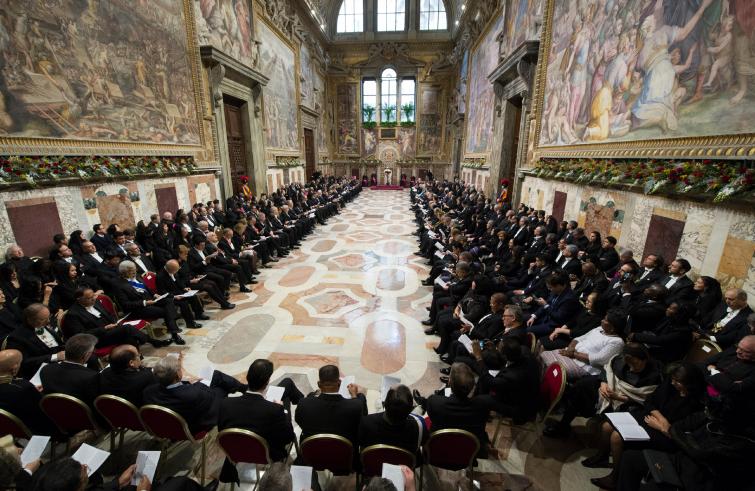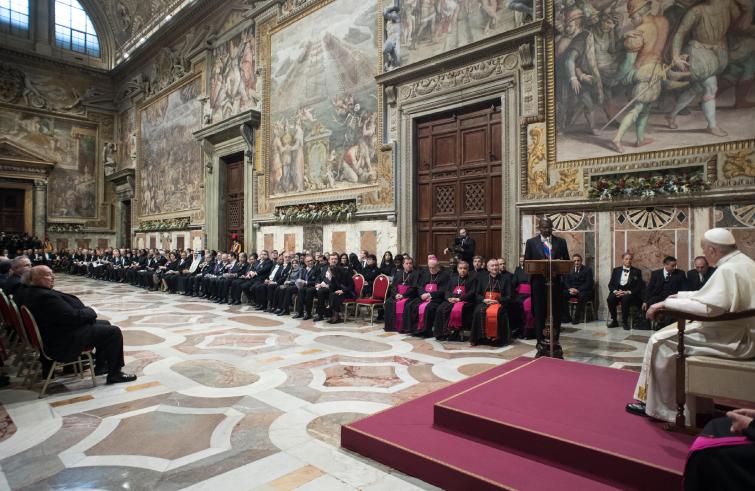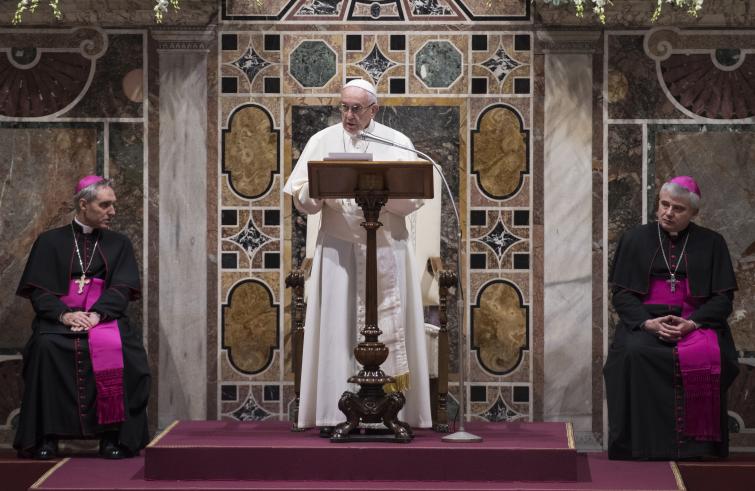
The Pope’s fifth speech to the Diplomatic Corps, that lasted almost one hour, welcomed with a long applause, began with a quotation from US President Woodrow Wilson, highlighting the “equal dignity” of all nations that is necessary to avert all conflicts – upon the centenary of the end of the First World War –, and ended with an appeal to Europe to become a protagonist in the consolidation of peace against the backdrop of today’s “third world war fought piecemeal.” The question of migrants, that Europe should be proud of, is at the heart of Francis’ address– as in similar speeches delivered over the past years – . In this respect the Pope thanked Italy in particular for her efforts and urged to abandon the “familiar rhetoric” by reflecting more deeply on one of the four verbs of the latest message for the World Day of Peace: to integrate.
Upon the seventieth anniversary of the Universal Declaration of Human Rights, the final invitation is one of foresightedness: that very foresightedness of the builders of the medieval cathedrals spread across our Continent. They knew that they would not see the completion of their work. Yet they worked diligently, in the knowledge that they were part of a project that would be left to their children to enjoy.
Multilateralism. In the year marking the centenary of the end of the First World War, the Pope said in his opening remarks, we can learn two lessons: the first is that “victory never means humiliating a defeated foe”, the second is that “peace is consolidated when nations can discuss matters on equal terms”, as foreshadowed by US President Woodrow Wilson one hundred years ago.

Violated rights. Since 1968 a number of “new rights” were claimed , that not infrequently conflict with one another. For Francis there is the risk that “we will see the rise of modern forms of ideological colonization by the stronger and the wealthier, to the detriment of the poorer and the most vulnerable.” In the year marking the 70th anniversary of the Universal Declaration of Human Rights, many fundamental rights continue to be violated, these include the rights of children, of old people, of women, of families fleeing from wars or victims of trafficking. Furthermore, it is important to safeguard the right to health, ensuring everyone’s access to medical care and treatment.
Today the “perverse logic of war” appears to prevail over the humanitarian activities of international organizations. For the Holy See integral disarmament and negotiations are the preferential avenues for the achievement of peace. The Pope mentioned the encyclical Pacem in terris to emphasize the seriousness of our present times:
“there is no denying that the conflagration could be started by some chance and unforeseen circumstance.” For Francis, the Korean peninsula is the most dangerous battlefront.

Middle East. Francis devoted a “special thought” to Israelis and Palestinians, renewing his appeal to respect the “status quo” of Jerusalem and allowing “the presence of two independent States in the region within internationally recognized borders.” Also the “dear Venezuela” needs peaceful solutions to view the future with renewed serenity.
Especially in the West, the family is considered “an obsolete institution”, “fleeting relationships” are preferred to it, but genuine policies to support the family are needed to reinvigorate society and overcome the “demographic winter” it plunged into. Without forgetting the tragic situation of” families torn apart by poverty, war and migration.”
To be welcoming. In the area of migration, the plea is
“to abandon the familiar rhetoric and start from the essential consideration that we are dealing, above all, with persons.”
Today there is much talk about migrants and migration, at times only for the sake of stirring up primal fears, but migration has always existed. “The majority of migrants would prefer to remain in their homeland”, the Pope pointed out, “Instead, they find themselves “forced by discrimination, persecution, poverty and environmental degradation” to leave it behind…”. To welcome others by practising the virtue of prudence, is Francis’ invitation, thanking Italy in particular and calling upon Europe to be proud of migrants, “whose arrival should spur Europe to recover its cultural and religious heritage.”

To integrate. “Those who welcome are called to promote integral human development, while those who are welcomed must necessarily conform to the rules of the country offering them hospitality, with respect for its identity and values.” In reiterating these words, the Pope referred to the fourth verb of the message for the World Day of Peace: to integrate.
“Integration is a ‘two-way process’, entailing reciprocal rights and duties.
In the current international situation, ways and means are not lacking to ensure that every man and every woman on earth can enjoy living conditions worthy of the human person.”
Employment. The speech to the Diplomatic Corps ends with a strong appeal to ensure the right of employment, that in many parts of the world is lacking or is scarcely available, especially for young people. “Often it is easily lost not only due to the effects of alternating economic cycles, but to the increasing use of ever more perfect and precise technologies and tools that can replace human beings”, is Francis’ cry of alarm, denouncing the “inequitable distribution of the work opportunities,” and the tendency “to demand of labourers an ever more pressing pace”, to the detriment of the sacrosanct right to days of rest. Not to mention the situation of children, victims of the scourge of juvenile employment. Finally, the appealed to the responsibility “of leaving to coming generations a more beautiful and liveable world.”










